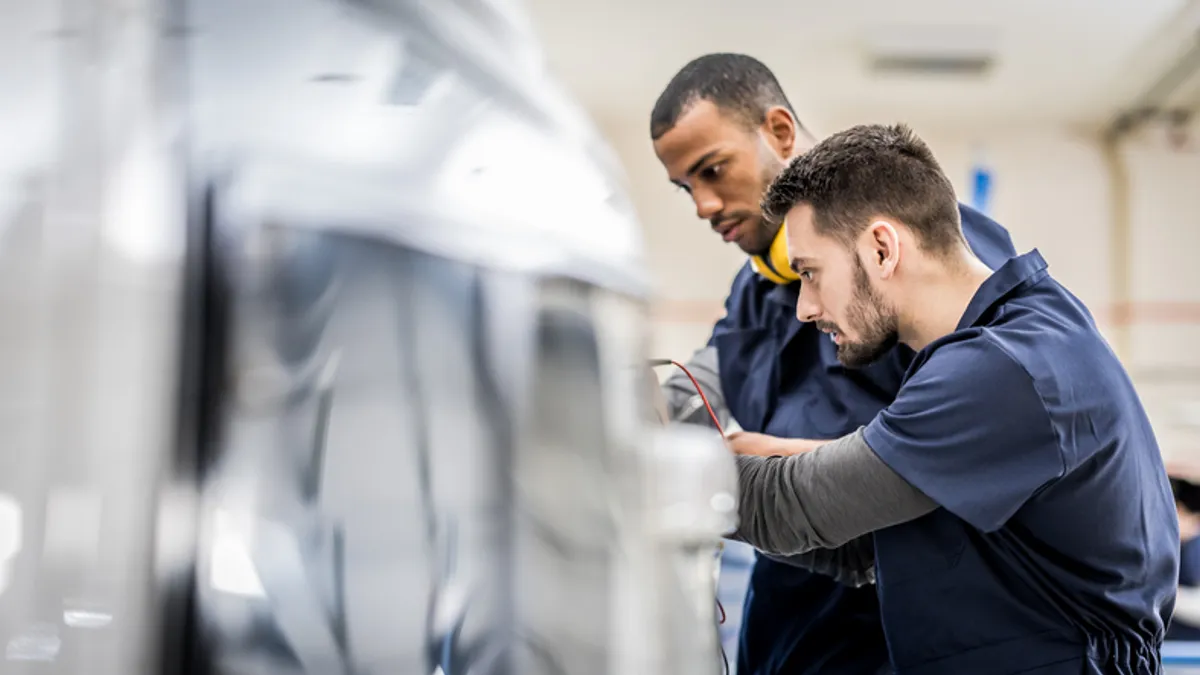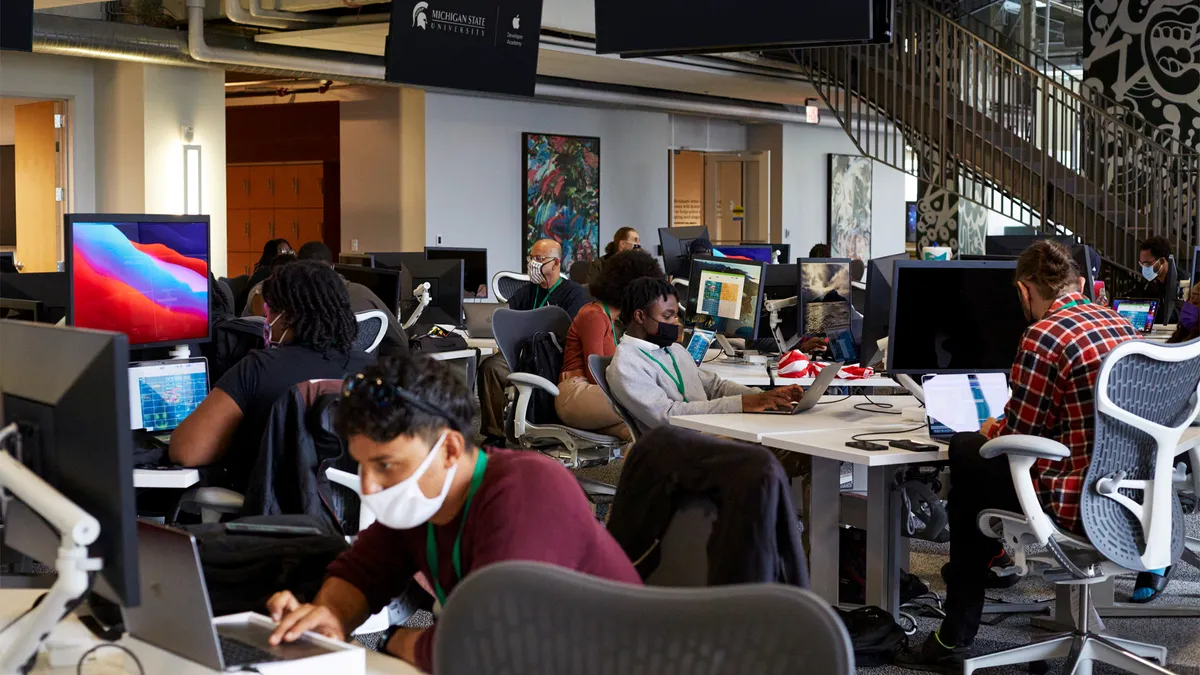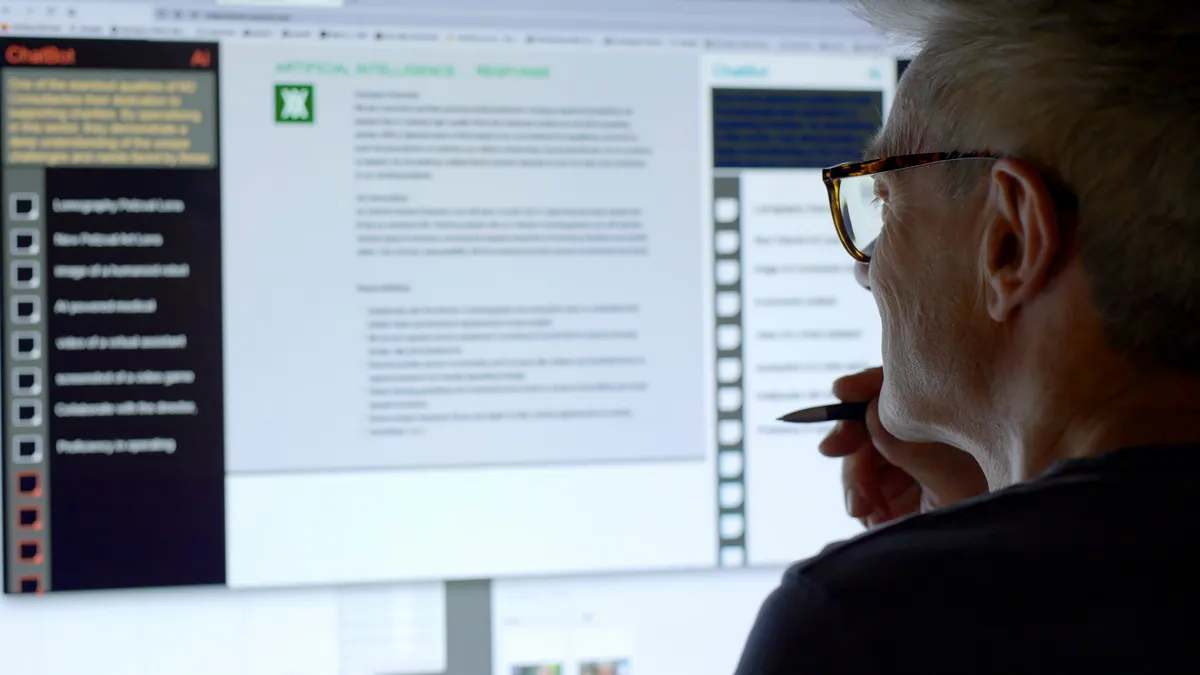HR leaders face myriad challenges in crafting a positive candidate experience and establishing a strong culture across organizations, and there's an added twist when it comes to internship programs: this must be achieved in an exceptionally short amount of time.
"As much as Facebook is evaluating interns for their long-term potential as future employees, we know for certain that interns are also evaluating whether Facebook is where they want to launch their career," Oscar Perez, diversity recruitment and programs manager at Facebook, told HR Dive. "Interning allows college students to make more informed decisions about the type of company they want to work for and helps them crystallize a vision for the type of employee they want to be."
The intern experience trifecta
Multiple academics and learning experts echoed Perez's sentiments to HR Dive, generally suggesting that HR can find success with three steps: a short, formal onboarding; building in mechanisms for continuous skill-building; and a focus on the value of exposure to the business world.
Some formal onboarding
While some experts suggest that employee onboarding plans should cover at least a new hire's first 90 days, that's obviously not feasible for an internship that may last only 90 days.
"Something on the order of 10 to 15% is not unusual," Brooks Holtom, a management professor at Georgetown University told HR Dive. "Two or three days of up front training, and then maybe two hours a week on a Friday helps to increase both the capacity of the people but also the probability that they enjoy the work and they come back."
Still, an employer's onboarding for traditional employees may provide a roadmap, especially when it comes to the early days. This should include administrative tasks, introductions and acclimation to tasks.
"For all interns [at Facebook], the first day of their internship is spent in New Hire Orientation," Perez shared. "Where you get to hear from employees around the company on guiding principles that we anchor in as a company, critical logistical information that you'll need to navigate your time as an intern, [and] get an understanding of the other interns that will be your ‘home-base' community during your time at Facebook."
From there, interns meet their teams and learn more about the scope of their internship project, Perez continued. They also attend role-specific training on tools, expectations and critical concepts for both their role and beyond.
It may help to think about onboarding in three parts — pre-boarding, orientation and ramping up to productivity — according to Leslie Deutsch, director of learning solutions at TEKsystems. Deutsch previously shared a model for onboarding traditional employees; a similar, albeit more streamlined, structure can help when thinking about interns, she said.
"You want to give them exposure to your organization," Deutsch told HR Dive in a February interview, adding that it's important to make clear company values, mission and vision. Although, if interns are there to support a specific project or initiative, it may need to be more detailed, she said.
Pre-boarding can also be valuable, both as a way to engage the intern as a high-potential full-time candidate and to ensure they are learning as much about the company as they can before their first day. "I've seen pretty commonly [that] the onboarding and training actually starts before they even formally start the job. It's about building the relationship," Nicole Coomber, a professor of management at the University of Maryland, told HR Dive. "There are a lot of smaller interactions that happen before they come on board so that they have a lot of clarity on what they're actually doing when they get there."
Continuous, experiential training
Following formal onboarding, HR will want to focus on continuous learning, according to Holtom.
He noted that such efforts are good for building capacity and making sure that interns feel they are gaining from the experience. There are a lot of ways to deliver this kind of training, however, and it does not need to be formal or in-person; it can be worthwhile, for example, to make learning opportunities experiential.
"[Students] want to gain the experience that prepares them for the next professional opportunity and the chance to build relationships with other professionals in their field. That really sets apart a positive internship experience from a negative one," Rachel Loock, associate director of career services at the University of Maryland's Robert H. Smith School of Business, told HR Dive.
For graduate school interns, experiential learning can be particularly valuable because they are already experienced professionals that may be making a career switch. They may need to get up to speed on certain software or business concepts to successfully make that switch.
"MBA internships are often used as a ‘bridge' to pivot from one industry or function to another, Doreen Amorosa, associate dean of career services at the Georgetown McDonough School of Business, told HR Dive. "Successful internships allow MBA students to demonstrate newly acquired academic skills which enable those career transitions," she said.
Internships can also provide management training for an employer's high-performing employees, Coomber suggested. Interns benefit from working with highly engaged, high potential leaders and the employee benefits from new leadership experience.
If not experiential, companies can also offer tangible skill development offerings for interns. For example, PwC offered interns access to a data analysis certification to help them get up to speed on this increasingly important skill. "We did make [the course] available to our interns for free when they would intern with us," Rod Adams, U.S. recruitment leader at PwC, told HR Dive. "It was a way to help them build some of the skills they weren't necessarily getting on campus."
Exposure and coaching
Given their relative inexperience, interns have much to gain from simply witnessing the operations of a company and meeting leaders around an organization.
"A few people will have gained experience with PowerPoint or some new technology, but I would say the vast majority of learning is about the organization, about the people, about the process, about the type of work," Holtom said.
This kind of exposure can be deliberately built into the program via a coaching mindset.
"Internships need coaching," Coomber said. "It's a particular leadership style, where you're being very clear about what you want them to do. So you want a lot of clarity around what you actually need from them." This involves explaining why a task is done in a certain way, what the company has learned through a process and how to provide feedback.
Some ways to provide unique opportunities for exposure that may also combine experiential learning include: projects that involve working with other departments, presentations to senior leadership, informal meet-and-greets, and company-wide social events.
Relationship maintenance
When pre-boarding traditional employees, the primary goal is to make sure they're familiar with the company and as ready as they can be on Day 1 to hit the ground running. For interns, the primary goal of outreach should be relationship building.
"I think the more you focus on that relationship before they formally start, and the more you can offer them support and coaching in that time period, the more value you're going to get from them," Coomber said.
Given the ultimate goal of hiring interns is often to source future employees, the internship really is a feeling out process for both the company and intern, where staying in touch early and often will go a long way.
"It's that ability to assess things like cultural fit and person-job fit during the internship that helps create more committed employees when they come on after they finish their degrees, so you lower the probability of subsequent turnover because they already know about the culture and the job," Holtom said.
Upon their return to campus, students will be able to supplement their coursework with realistic context given their experiences over the summer. Multiple sources told HR Dive they recommend staying in touch with interns after the program is over as a way of keeping the relationship strong, building on learning outcomes and, ultimately, driving retention.





















